
VARIVASYA-RAHASYA
Book Specification
| Item Code: | IDG575 |
| Author: | SRI BHASKARARAYA MAKHIN |
| Publisher: | The Adyar Library and Research Centre |
| Language: | English |
| Edition: | 2022 |
| ISBN: | 9788185141305 |
| Pages: | 188 |
| Cover: | Paperback |
| Other Details | 8.5" X 5.8" |
| Weight | 270 gm |
Book Description
About the Book:
BHASKARARAYA, an authority on Srividya, flourished in the 18th century. He has commented on the Lilita-sahasranama, the Saundarya-lahari, the Bhavanopanisad etc.
He did much to dissuade devotees from following the vamacara rites and advocated the daksinamarga of Sri-vidya worship.
The Varivasya-Rahasya is an independent treatise and its commentary is by the author himself.
The English translation is by Pandit S. Subrahmanya Sastri, a traditional Sanskrit scholar who was on the Adyar Library staff for a long time. He edited several works for the Adyar Library
A WORD of apology is needed for this presumptuous at- tempt of mine to edit this treatise, V ARIVASYA-RAHASYA, by Sri Bhaskararaya, with a commentary of his own. More than ten years ago, I happened to go through the printed edition of this work edited by Mr. R. Ananta- krishna Sastrin of the Adyar Library and printed in the Tattvavivecaka Press, Bombay, in the year 1901. As I came to understand that it was out of print even then, I transcribed the whole work for my own use and found therein some errors and omissions. At that time I could not satisfactorily accomplish the task of rectifying the errors and supplying the omissions, however much I tried to do so. Great credit is no doubt due to Mr. R. Anantakrishna Sastrin for having brought out the work, notwithstanding the errors. Owing to other pressing calls on my time in connection with the editing of certain rare works, I was not till now in a position to devote the necessary time and attention for bringing out a correct and complete edition of this work.
Last year, during my three months' stay at Adyar, in connection with the publication of some works by the Theosophical Publishing House, when I had occasion to talk to my revered friend, Mr. A. K. Sita- rama Sastrin of the Vasanta Press, about the desirability of bringing out the correct and complete edition con- templated by me, he not only readily fell in with my views, but also promised to help me in the undertaking in all possible ways. This is no doubt due to the great admiration which he has for Sri Bhaskararaya and his works. On my return to Tanjavur, my friend, Mr. R. Krishnasvami Sastrin, Sub-Registrar, when appro- ached for advice regarding the publication of the work, agreeably surprised me by stating that he had two MS. copies of the work, one on paper and the other on palm leaves, both in Grantha characters and offered to place them at my disposal. My joy knew no bounds at this unexpected find of MSS. and this greatly heartened me in my further endeavours. Meanwhile an interleaved copy of the printed edition in the possession of Mr. C. K. Ramachandra Ayyar, Retired Engineer, Kumbakonam, with corrections carried out and omissions supplied, after comparison with a palm- leaf MS. belonging to a descendant of Sri Bhaskara- tAya, was also made available to me, through the courtesy of the owner, and a MS. on paper in Deva- nagari characters belonging to the late Sambasiva Sastrin, Sthanika of the SrI Bangaru Kamaksi Amman Temple, Tanjavur, was kindly placed in my hands by my friend, Mr. T. Visvanatha Rao of Tanjavur. With the help of the latter two MSS., I began to edit the work and prepare copy for the Fress. At this stage the two MSS. promised by Mr. R. Krishnasvami Sastrin reached my hands, as also a Malayalam edition printed about twelve years ago, with sloka-s 148-158, 164, 166 and 167 of the text excised and two new sloka-s 1 added at the end, with a Malayalam commentary by Kandiytir Mahadeva Ayyar.
I have reasons to believe that the Malayalam edition is entirely based on the printed Devanagari edition. The above-mentioned four MSS. and two printed editions were of immense help to me in the preparation of the present edition. In the printed edition, certain portions of the commentary of some of the sloka-s of the first part and of nearly a third of the second part are not to be found. Besides this, in one or two places the readings adopted in the text do not agree with those adopted in the commentary and sloka-s 94, 112 and 158 of the present edition are not to be found there. The four MSS. were service- able to me in the detection of errors in their copying and determining the correct form. The omissions in the printed edition have been supplied by me with the help of the MSS., especially Mr. Sambasiva Sastrin's Devanagari MS., which contained four lines of commentary which the others did not contain, and without which the meaning of the text would have remained obscure. In determining correctly the vyakulaksara-s found on page 106,2 the paper MS. of Mr. R. Krishnasvami Sastrin was more helpful to me than the rest. The tabular statement attached to the book, although based upon the statement published in the Malayalam edition, has been improved upon by me and Mr. C. K. Ramachandra Ayyar, by the intro- duction of some changes which we considered suitable. The Aksara-s inserted in the Sri-cakra, published for the first time in this book, are based on the Srl-cakra published in the Prapancasara, Sri Vani Vilas Press edition. The Aksara-s in the Bindu, Trikona and Astakona appearing in a separate page have been inserted, as indicated in the Prapancasara-samgraha, The half-tone block was prepared with the help of a photographic copy of the picture of Sri Bhaskararaya secured by Mr. C. K. Ramachandra Ayyar.
As this work could be of use only to persons well versed in Sanskrit and in Mantra lore, it was thought expedient to publish an English rendering of the same for the benefit of devoted students not so qualified.
My thanks are due to Mr. T. R. Srinivasa Ayyangar, B.A., L.T., Retired Headmaster, Kalyana- sundaram High School, Tanjavur, for his great help in giving a free rendering of the work in English, which, without being a mere verbatim translation of the text, makes use of important portions of the commentary as well, with a view to make the sense clear. I have also to give expression to the gratitude I owe my friend Mr. R. Krishnasvami Sastrin, who, with his charac- teristic kindness, undertook to write an introduction to the work, in addition to lending me two of the MSS.
and helping me also otherwise. I cannot adequately express my sense of obligation to Mr. A. K. Sitarama Sastrin but for whose help, so promptly and cheerfully rendered, this humble effort of mine would not have seen the light of day. The chief object of those that have laboured hard for the publication of this work has been to propagate the Sri-vidya, as. expounded by Sri Bhaskararaya, among as large a circle of U pasaka -s as possibIe.
INTRODUCTION:
THE VARIVASYA-RAHASYA is a classic treatise dealing with the secret of worship as elaborated in the Sakta Agama-s, which are themselves based on the eternal Veda-s. According to the Sastra, the worship of the Supreme is of tow kinds : External (bahya) and internal (antara). In the external method, Cakra-s, images and other concrete physical objects are used as emblems and upacara-s are offered to them. For purposes of internal worship are Supreme Goddess is invested with three forms: the sthula (gross), the suksma (fine) and the para (the highest). The first or Sthula form possesses hands, feet and other bodily organs and can be seen and felt by those who have acquired Mantrasiddhi. The suksma form is composed of the letters of the Sanskrit alphabet, which go to form the various Mantra-s and this Mantra-form is capable of auditory apprehension by gifted persons. The para form is of the nature of Caitanya (intelligence) and is the object of pure mental contemplation. Beyond these three forms is that transcendent aspect of Sri Devi, where she is experienced as the Innermost Self of Bliss. It is for bringing about this transcendent experience, which is the summum bonum of life, that the Veda-s and their auxiliary Vidya-s were revealed by Isvara Himself at the beginning of creation. The Veda-s were however found to be too voluminous to be of use to all and hence the sacred Gayatri was extracted, as containing the quintessence of the Veda-s. This Gayatri has itself two forms : The lower (exoteric), and the higher (esoteric). The lower form is the familiar one, consisting of twenty-four letter divided into three pada-s (feet), With a fourth pada of eight letters occasionally added for certain spiritual purposes. The higher (esoteric) form of the Gayatri-mantra is what is known as Srividya-panchadasaksari, which is secretly handed down from teacher to pupil and which alone is capable of leading the aspirant to the attainment of Moksa. Each letter of the Srividya has its own presiding deity and special signification, and a correct knowledge of these meanings and also the full meaning of the entire Mantra is absolutely essential, if its japa (meditative repetition) is to bring about the desired effects. The great Bhaskararaya devotes his work, the VARIVASYA-RAHASYA, to an elaborate and through exposition of these various meanings and concludes his work with a convinced demonstration the Srividya-pancadasaksari only enunciates the grand Upanisadic truth of the identity of the individual self with the transcendent Self, contained in the famous Mahavakya, Tat tvam asi. His stern denunciation of the ignorant people, who indulge in the show of mere external worship and disregard the inner and more important method expounded by him, deserves special notice and consideration.
The VARIVASYA-RAHASYA IS composed of tow sections (amsa-s) and contains 167 Sloka-s numbered consecutively. Both the VARIVASYA-RAHASYA and the commentary, Prakasa, which accompanies it, are from the pen of Bhaskararaya. This work appears to be the first treatise which Bhaskararaya wrote on his favorite subject, Srividya. He makes content reference to this work in his later treatises on Mantra-sastra like the Setubandha and the Lalitasahasranama-bhasya, while no mention is made of his other Mantrasastra works in the VARIVASYA-RAHASYA. The reader who wishes to have a bird's eye view of the contents of the book is referred to the helpful and detailed table of contents prepared by the editor, Pandit S. Subrahmanya Sastrin, and prefixed to it.
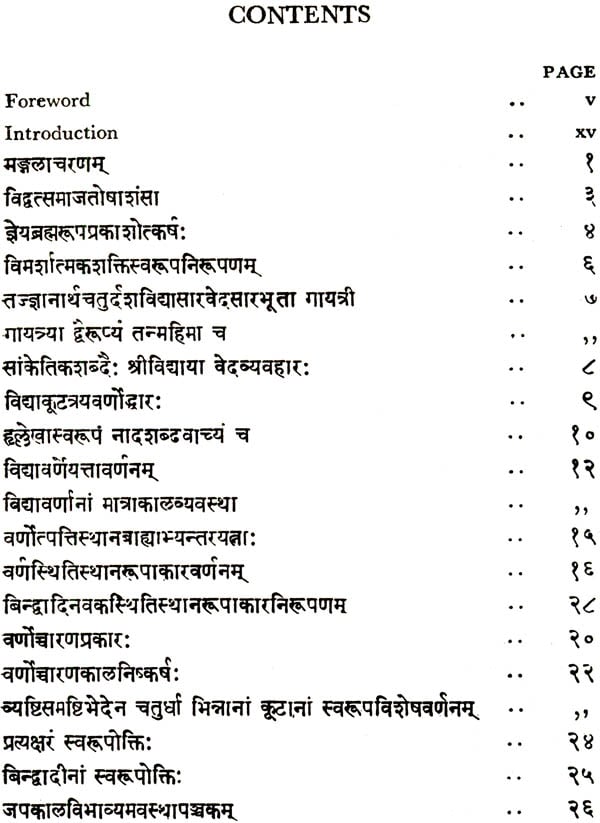
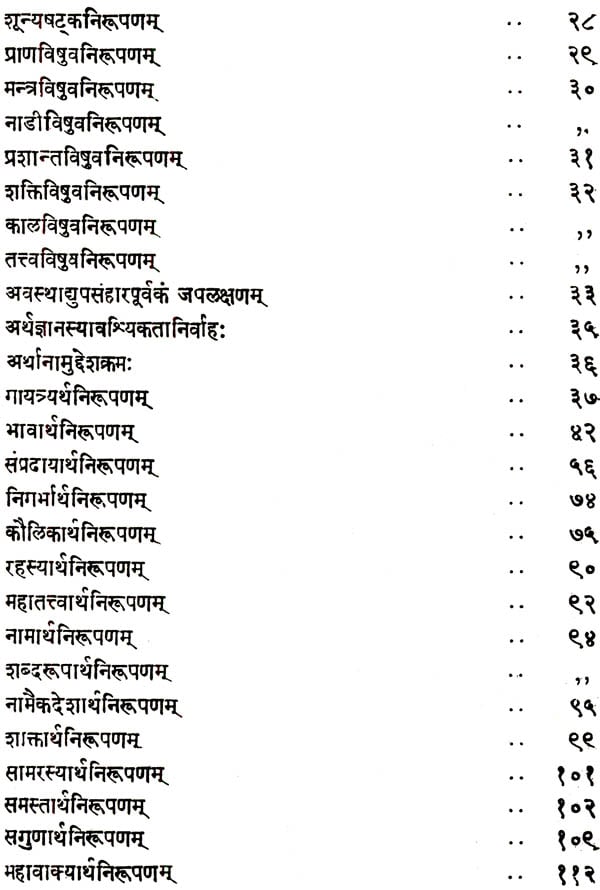
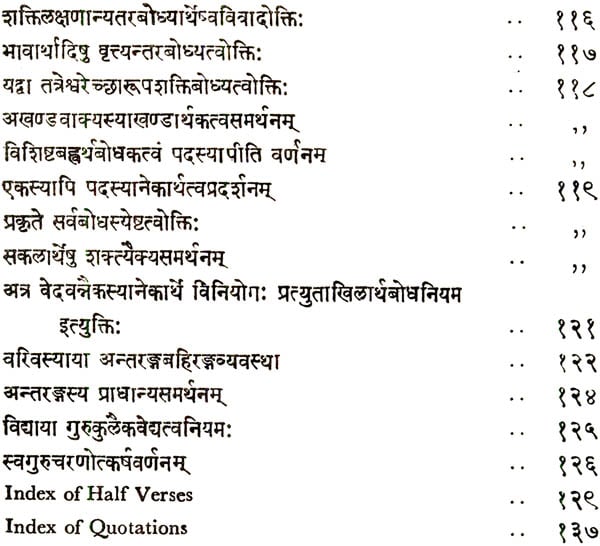
<

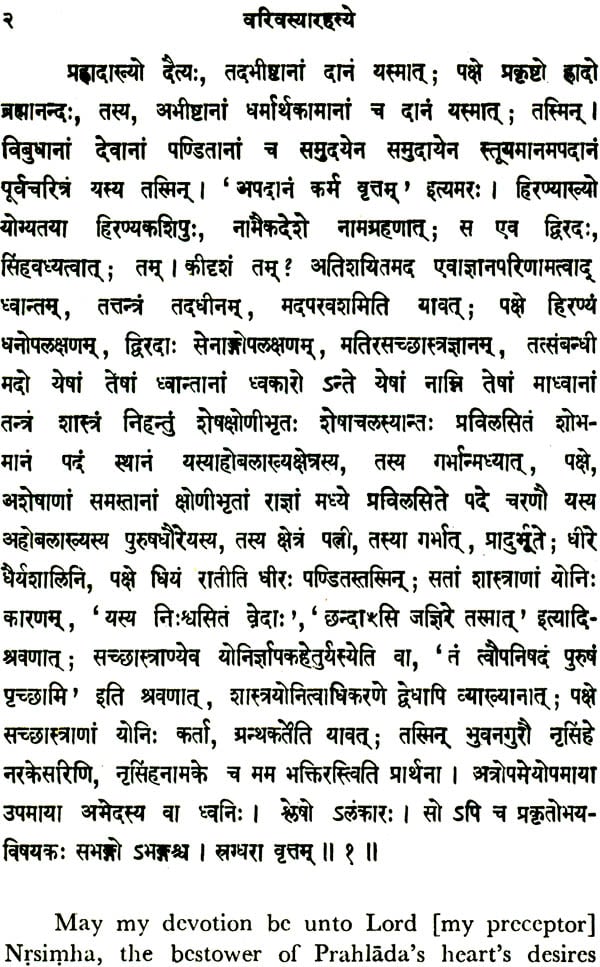
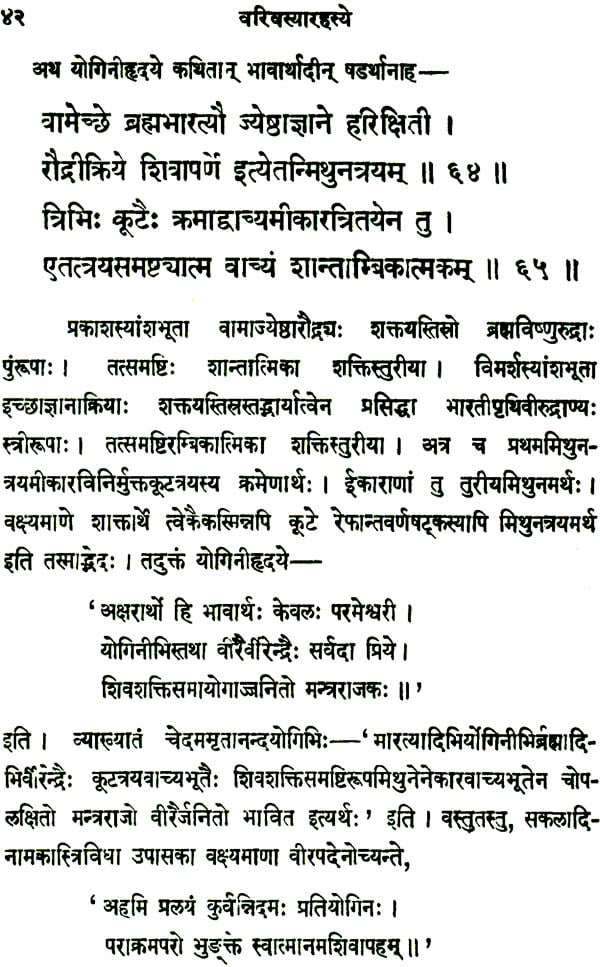

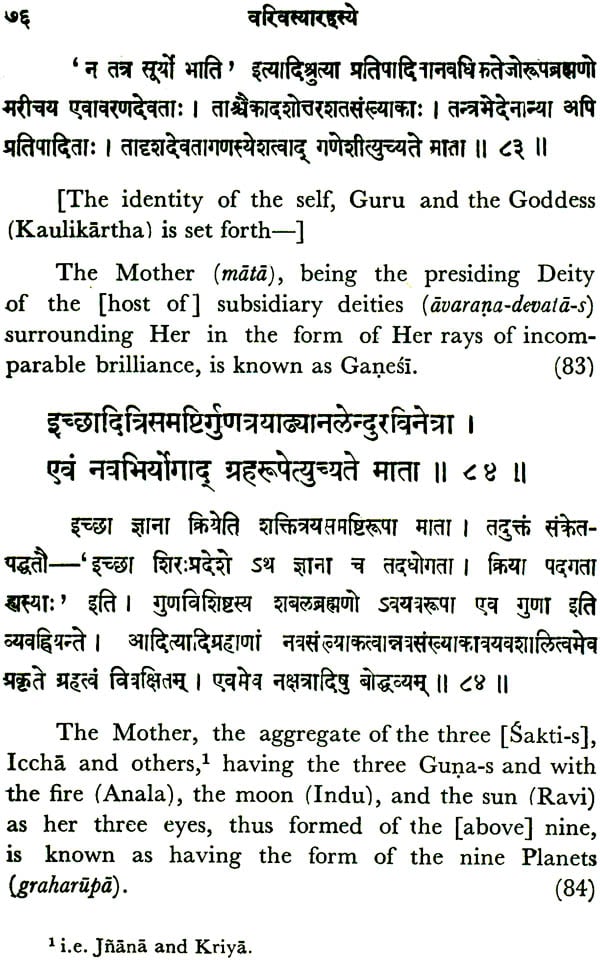

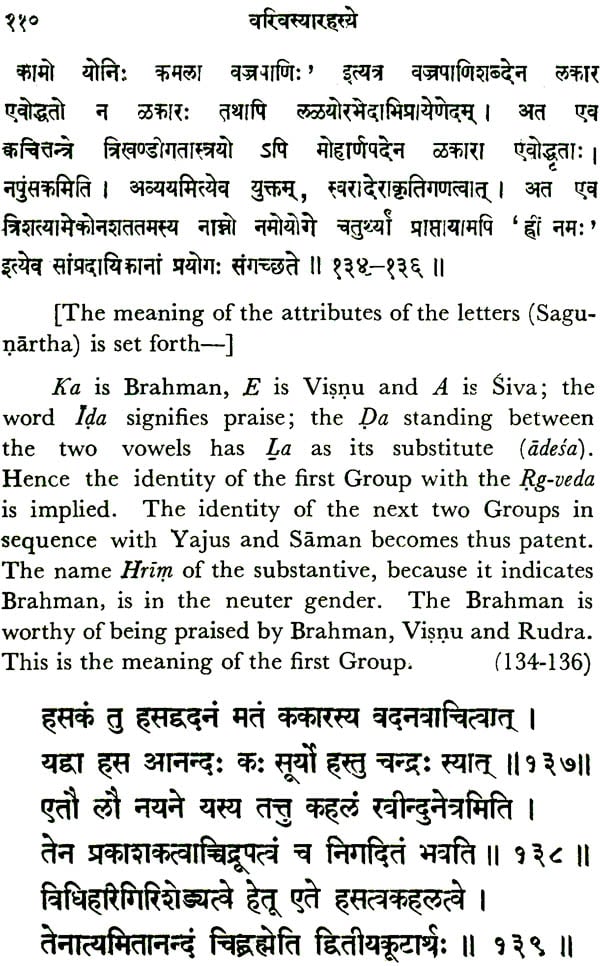
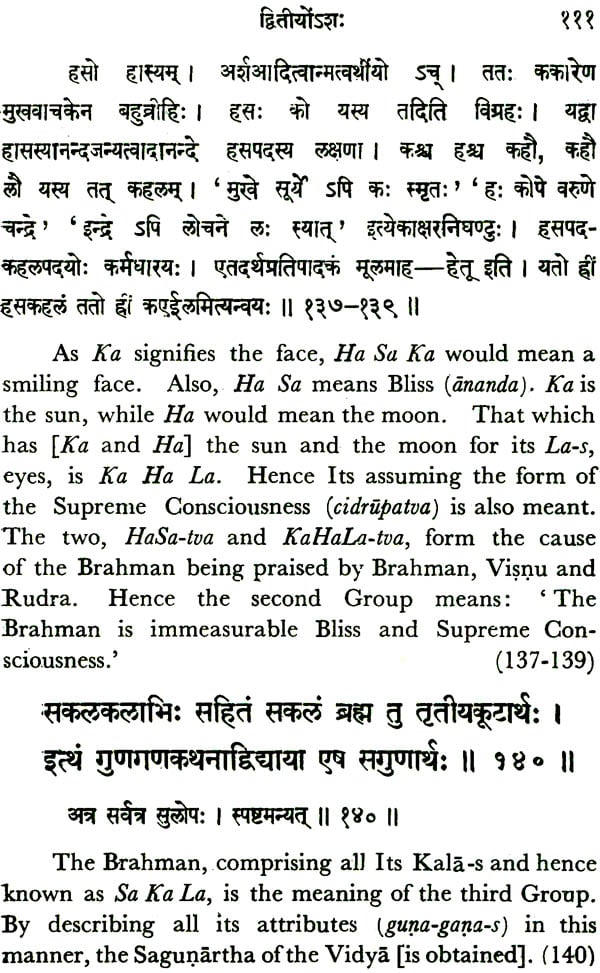
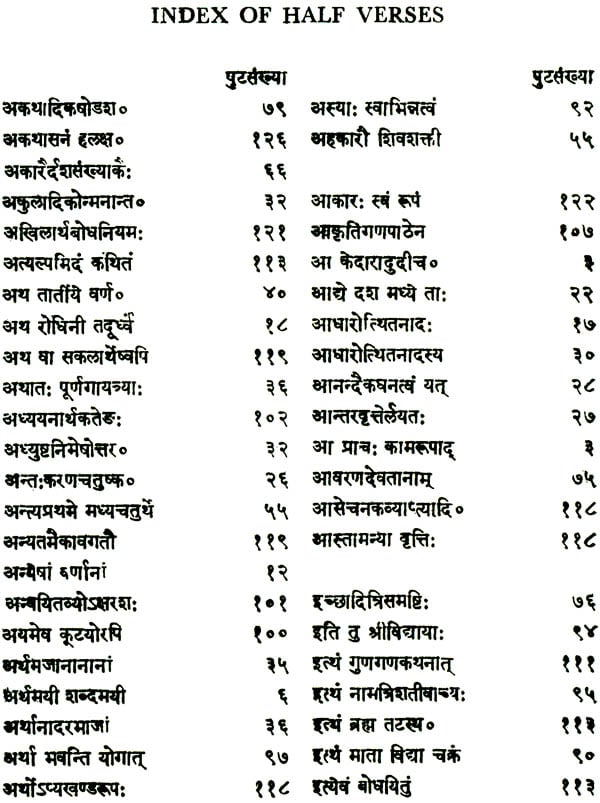
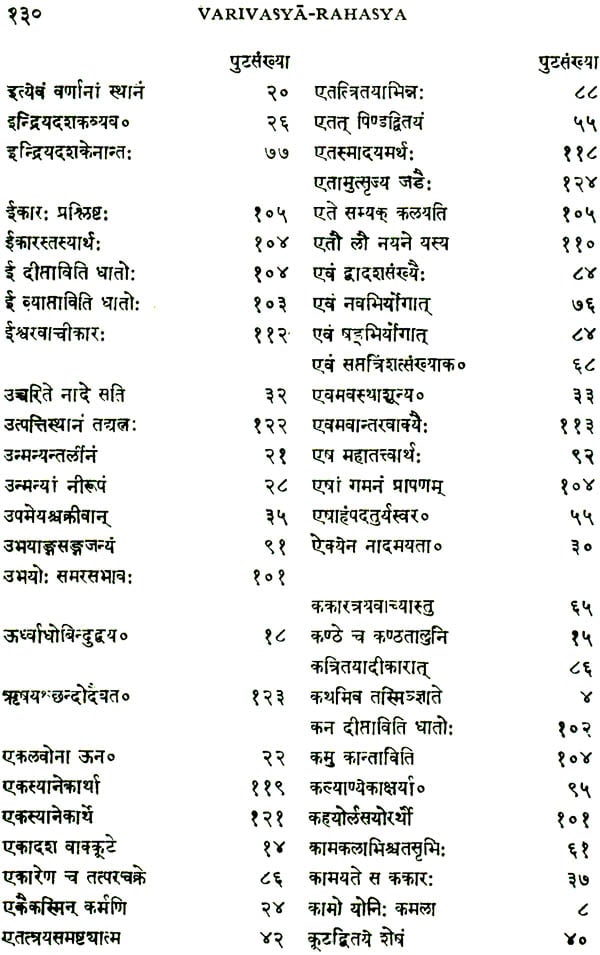
Click Here for More Books Published By Adyar Library and Research Centre





